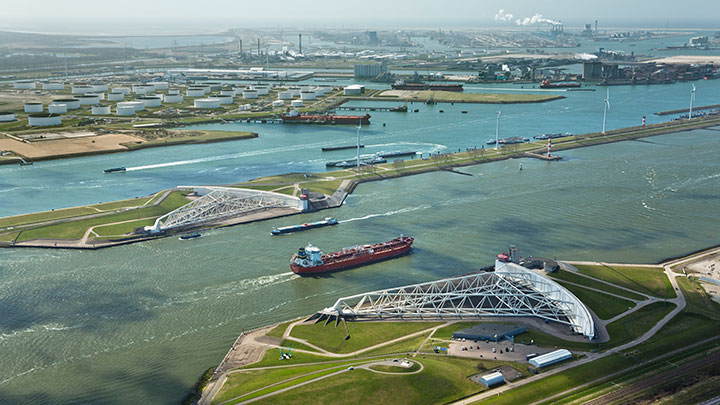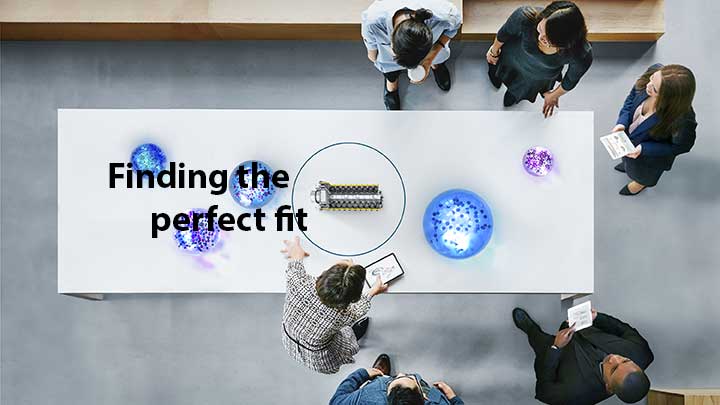Powering sustainable shipping
The global shipping industry is working towards a sustainable future. This means that you will face important choices about the technologies and investments you need in order to stay competitive and at the forefront of compliance for decades to come.
At MAN Energy Solutions, we are helping to shape the sustainability agenda and provide a clear path for you to achieve your goals. As the industry’s trusted partner for class-leading marine systems, we have the expertise and solutions ready
now to support whatever decisions you make.
Introduction to future fuels
Reduction of greenhouse gas emissions in maritime shipping to meet the 2050 targets requires all parties involved and stakeholders to take action.
No matter what vessel you operate, our proven, fuel-flexible engines and propulsion systems enable you to safeguard your future fuel strategy and allow you to take advantage of favorable market conditions. We can also support you with a complete portfolio of retrofit solutions, upgrades, and services, designed to optimize returns from your existing investments.

Future fuels survey 2022 - results
At the end of 2022 we asked our four-stroke customers to participate in our short survey about Future fuels in the maritime shipping industry. Out of all replies, we have extracted and summarized the most relevant results and are happy to share them now with you.
When do you expect the following fuels and engine attributes to be relevant in your application?
In the short and mid term, biofuels and methanol are expected to take the lead and be most relevant for four-stroke applications in the upcoming years, in parallel to a continuously relevant share of LNG driven vessels.
Mid to long term, additional fuels, such as NH3 ready or even H2 may gain relevance.
Future fuels for the maritime industry – Download our new white papers
The shipping industry must halve its GHG emissions by 2050. There are many future fuels to choose from. But which one is right for you?
Learn more about future fuels for the marine industry in our white papers.
Read more about the different future fuel types and discover our extensive portfolio of products, solutions, and services.
Get in touch with our experts
Would you like to learn more about future fuels and which technologies, solutions, and products best meet your needs?
Our global network of dedicated engineers is happy to point out the perfect-fit solution for you and your business. Start your engines now and reach out to us today.

Explore your fuel options
We can now offer multiple options for full fuel flexibility, engine-integrated emission reduction technologies and digital & data-supported operation.
Check out our configurator for two- and four-stroke engines, and find out more.
Related news
EGR Offered for Dual-Fuel ME-GA Engine
MAN Energy Solutions has announced that it is to offer its proprietary EGR (Exhaust Gas Recirculation) system as an emissions solution for its new, low-speed ME-GA engine, the Otto-cycle variant of its established ME-GI dual-fuel engine. EGR is a NOx-emissions-reduction technique that ensures IMO Tier III-compliance in both diesel and gas mode.
The company has long experience with the emission-reduction technology and reported the first order for an EGR system in 2011 when it was fully integrated within the MAN B&W 6S80ME-C9 main engine of a 4,500 teu containership newbuilding.
Thomas S. Hansen, Head of Promotion and Customer Support, MAN Energy Solutions, said: “Nine years have passed since our very first EGR system passed its Factory Acceptance Test, and the knowledge we have subsequently gained in the field has led to today’s fully-mature solution. Our EGR system not only achieves NOx-compliance, but also delivers a performance upgrade for both conventional and now ME-GA engines.”
MAN Energy Solutions reports that EGR will enable the ME-GA to reduce specific gas consumption by ~3%, and specific fuel-oil consumption by 5%. It will also significantly reduce methane slip by 30 to 50% and solve the issue related to pre-ignition on Otto-cycle engines.
Hansen continued: “With our hard-earned experience – added to the rigourous testing that all our EGR systems undergo – we are the de-facto market leader and play a vital role in decarbonising the maritime industry. Our robust EGR solutions fully integrate with other ship systems and are easily integrated with the ME-GA engine.”
MAN Energy Solutions states that it has received orders for over 241 engines with EGR, with more than 33 units already in service. The company expects to deliver the first, commercial ME-GA low-pressure dual-fuel engine by end-2021.
EGR solution
As previously stated, EGR will help reduce the ME-GA’s methane slip by 30 to 50%, while lowering specific gas consumption by around 3% and specific fuel-oil consumption in diesel mode by 5%. EGR will enable the ME-GA to meet Tier III requirements in both fuel oil and gas modes without additional aftertreatment.
MAN Energy Solutions plans to make the EGR option available from late 2021, concurrent with the introduction of the ME-GA. The company’s experience with designing and delivering low-pressure and high-pressure EGR versions has enabled it to bring the new solution to market in a relatively short time.
The ME-GA EGR solution is a high-pressure system, which can be integrated into existing engine-room designs, and the EGR unit itself does not change the engine footprint. Its design-similarity to that of ME-C engines’ EGR systems will lower its price point, since the supply chain and components are already matured.
The EGR system works through drawing around 30 to 50% of the engine’s exhaust gas into the EGR receiver, where it passes through a pre spray to lower its temperature, before passing through a cooler spray. After passing through a water-mist catcher, the gas then goes through a blower to increase pressure back up to scavenging air pressure, before being fed back into the compressor and the engine.
The volume requirements of the ME-GA EGR system are significantly lower with, for example, less pipework required than for low-pressure EGR solutions.
Introducing an EGR solution also improves the stability of the combustion process. MAN Energy Solutions is currently researching how far it can lower methane slip while maintaining a good equilibrium with recirculation.
About ME-GA
MAN Energy Solutions is developing the high efficiency, low-pressure, two-stroke, dual-fuel MAN B&W ME-GA engine at its Research Centre Copenhagen. The engine delivers a low CAPEX solution aimed at certain vessel types and applications – such as LNG carriers – that are able to use ‘boil-off’ gas as a source of fuel, or smaller ships where low capital outlay is a priority.
Based on the well-proven MAN B&W dual-fuel design with minimal installation requirements, the MAN B&W ME-GA uses an efficient ignition concept and unique gas-admission system that delivers safe and reliable operation.
The ME-GA furthermore features minimal operational costs, simple supply and purging concepts, and low maintenance costs for its fuel-gas supply system.Documents
-
20201124_MAN_ES_PR EGR ME-GA_EN
-
20201124_MAN_ES_PR EGR ME-GA_DE
Contact
Nils Søholt
Trade Press Marine
Group Communications & MarktingMAN Energy SolutionsTeglholmsgade 412450 Copenhagen SVDenmark
nils.soeholt@man-es.com t +45 33 85 26 69Available languages
- DE ·
- EN
Get notified about press releases
Explore more topics
Alternative fuels for your two-stroke powered vessel: Ammonia, methanol and methane in focus
Register for our next MAN ExpertTalk on alternative fuels for large merchant marine vessels. We will provide insights into the most promising marine fuels of the expected future fuel mix for two-stroke vessels, namely ammonia, methanol and methane.
Further, we will inform about the latest product developments and applications as well as reasons why these fuels have the potential to offer a straightforward path for the future maritime energy transition.
- Wednesday, April 24, 15:00 – 15:45 (W. Europe Standard Time)
- Thursday, April 25, 10:00 – 10:45 (W. Europe Standard Time)
